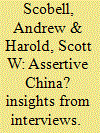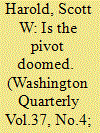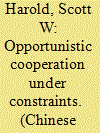|
|
|
Sort Order |
|
|
|
Items / Page
|
|
|
|
|
|
|
| Srl | Item |
| 1 |
ID:
122596


|
|
|
|
|
| Publication |
2013.
|
| Summary/Abstract |
Recent years have witnessed the emergence of a more assertive China. What happened to China's "peaceful rise" and "charm offensive"? What explains the changes in China's foreign policy? According to interviews with Beijing and Shanghai-based analysts, China's assertiveness between 2008 and 2010 can be divided into two waves, each triggered by a different cause. The first wave seems triggered by a sense in Beijing that Washington, DC was more differential to China's interests, and less committed to East Asia. The second wave seems best explained as China's response to what it perceived as a far more assertive and threatening United States. Both waves were amplified by two domestic challenges: Chinese leaders' hypersensitivity to popular nationalism and poor bureaucratic coordination among an expanding number of foreign policy actors.
|
|
|
|
|
|
|
|
|
|
|
|
|
|
|
|
| 2 |
ID:
136632


|
|
|
|
|
| Summary/Abstract |
U.S. foreign policy is beset by numerous simultaneous crises. In Syria, the Assad regime continues to commit massive human rights abuses, while Islamic State jihadis are seizing territory in Syria and neighboring Iraq. Russia has annexed Crimea and is threatening its neighbors from Ukraine to the Baltics. In Nigeria, Boko Haram is killing students while they sleep and abducting hundreds of young girls to sell into slavery, while the Ebola virus is killing thousands in neighboring West African states. And as if this wasn't enough, in Asia, China is on the march in the South China Sea, North Korea may test another nuclear device, and U.S. allies Japan and South Korea continue to feud over history issues. In light of these challenges, U.S. foreign policy analysts may understandably question the fate of President Obama's signature foreign policy initiative, the ‘pivot’ or ‘rebalance’ to the Asia–Pacific.
|
|
|
|
|
|
|
|
|
|
|
|
|
|
|
|
| 3 |
ID:
138166


|
|
|
|
|
| Summary/Abstract |
Given its goal of building a ‘New-Type Great Power Relationship’ with the United States, why doesn’t China demonstrate its good will towards the United States by cooperating more proactively on sanctioning Iran over its nuclear enrichment activities, a key US foreign policy goal that is also in line with Chinese stated policy on nonproliferation? This essay describes Chinese views of nuclear non-proliferation, the oil trade, and Iran’s geo-strategic importance from the perspectives of specialists in China’s arms control community, experts on energy trade, Middle East specialists and grand strategists. It characterizes China’s relationship with Iran as one of ‘opportunistic cooperation within constraints’, arguing that China–Iran ties are largely transactional in nature, aimed at maximizing benefits to China but limited by Beijing’s concern to avoid irreparably damaging its relationship with Washington. Chinese observers describe the Islamic Republic as a valued non-US-aligned partner in a geostrategically critical region; they also appreciate its substantial oil exports to China and see it as accepting of China’s rise. The article concludes that China is likely to continue to strive to maximize its relations with Iran to as great an extent possible, while doing the minimum necessary to support the P5 þ 1 negotiations and sanctions processes.
|
|
|
|
|
|
|
|
|
|
|
|
|
|
|
|
|
|
|
|
|